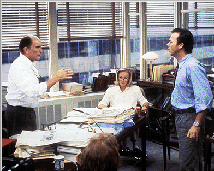Friday, March 25, 1994.
THE PAPER. Written by David Koepp and Stephen Koepp. Music by Randy Newman. Directed by Ron Howard. Running time: 112 minutes. Classifier's warning: some very coarse language, occasional violence. Mature entertainment.HE LIKES US. Big time movie-maker Ron Howard really likes us.
During the making of his big new urban fantasy, Howard said how much he liked "the compulsive behavior, the irreverent humour, the unhealthy lifestyles" of the working press.
We can see it in The Paper, his look at a single day at the (fictional) New York Sun, a grungy, down-market tabloid that smells of the caffeine, nicotine, alcohol and adrenaline needed to bring it to life every morning.
Want a metaphor?
Pregnant ex-Sun reporter Martha Ward-Hackett (Marisa Tomei) is due at any moment. With the wisdom vouchsafed to movie moms-to-be, she has a prophesy for her husband, Sun metro editor Henry "Hank" Hackett (Michael Keaton). "You know those days that change your whole life? This is one of them for us."
Want compulsive, irreverent, unhealthy characters?
Hank‘s editor-in-chief is Bernie White (Robert Duvall), a twice-married professional cynic currently learning to live with "a prostate the size of a bagel." Hank‘s managing editor is Alicia Clark (Glenn Close), an ambitious, back-stabbing martinet with a staff of 300 "doing work that they need 750 to do at Newsday." When White refuses her a raise, she goes behind his back to Sun publisher Graham Keighley (Jason Robards).
Today, Hank is considering a job offer from the uptown Sentinel, a stuffy establishment journal offering him regular hours and the opportunity to "cover the world." In addition, he has a crisis on the homefront as he scrambles to put out a paper offering responsible sensationalism.
The closest thing he has to an ally is indolent opinion columnist Dan McDougal (Randy Quaid), a gun-toting sociopath with a rapidly diminishing list of reliable sources.
An energetic mess, The Paper is nakedly nostalgic for a time when newspapermen were standard movie heroes, every bit as popular as cowboys or detectives. It recalls an era of crusading journalism, cut-throat circulation wars and fast- talking, hard-drinking, scoop-obsessed newshounds.
Want an explanation?
Howard, the Oklahoma-born child star, is now a balding 40-year-old. He's spent his entire life in show business, so it‘s no surprise that his nostalgia is not for reality, but for an image of it created by the movies.
He's good at recycling fantasies. The "Howard touch" — the infusion of gentle romanticism into familiar dreams — made hits of both Splash [1984] and Cocoon [1985].
He's less comfortable with reality. He bombed big with Gung Ho [1986], the story of a Japanese-owned U.S. auto plant that tackled a current issue with no previous movie equivalent.
The Paper, despite all its predecessors, misfires by seeking heroes in all the wrong places. Howard's film is not the story of some wonderfully wacky reporters, but of their small-minded middle managers.
A black comedy filled with as much knockabout humour as its clownish screenwriters could muster, The Paper hits the street with a hollow thud.
And, no, I really didn't like it.
The above is a restored version of a Province review by Michael Walsh originally published in 1994. For additional information on this archived material, please visit my FAQ.
AFTERWORD: I was so busy taking umbrage at his skewed view of the news biz that I failed to notice that director Ron Howard was in the midst of a bumpy transition from the frothy, PG-rated family pictures that had made him famous to a grittier, more serious film style. The Paper, his tenth feature, was followed a year later by Apollo 13, arguably his best movie. The mature Howard has shown a marked preference for thrillers (Ransom, 1996; The Da Vinci Code, 2006; Angels & Demons, 2009) and fact-based dramas (A Beautiful Mind, 2001; Cinderella Man, 2005; Frost/Nixon, 2008).
